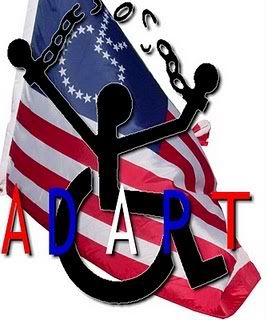I don't know if I'll ever get through all of the BADD posts, but I tried to at least read the ones from my regular readers, such as Laura from Lefty By Default. The Seahorse left a comment to her post asking how to become a disability awareness speaker, and I thought I would answer as well. If writing is half of my essence, then my ability to publicly speak on the fly is another quarter (ADAPT is the 4th).
So here's how to become a disability awareness speaker in one easy step:
JUST ASK
It's that simple, and basically what Laura does as well.
I received some formal training, but you don't have to. Most of what I did was just go in and talk about myself, until more recently. When you talk to little kids, that's what you do, and that's what I did for my first 3 years of speaking. Or I did teacher trainings and talked about my issues with school and what I did/did not like about teachers I'd had and what the best things are that teachers can do for their students. How hard is it to talk about yourself?
Hi, I'm Cheryl, I'm 17 and a senior at XY high school (yes I started that young). My favorite class is AP psychology. I have 1 brother and my favorite thing to do is horseback ride (that's how they instructed us to start).I have cerebral palsy, which is a neuromuscular disorder (older kids / adults) / that means that when I was born the part of my brain that tells my body how to move didn't work right (young kids). Go on to explain more about the spectrum of CP/how it manifests itself to me. Talk about school/work, whatever it is you do. Talk about how things were for you when you were their age. Give advice forinteracting with peers with disabilities. Open up to Q&A
It is just that simple. Little kids want to know if you like soccer (no) or what your favorite color is (purple). It's cute. Now of course I also talk about bipolar
So the asking part. When I was a freshman and lived in Long Island New York for a year there was a professor who always went through disability support and had students come in to talk to his special ed masters degree students. A friend who had been doing it asked me to join him, not knowing that I had 3 years experience under my belt. I jumped at the chance. Did it for a few classes both semesters.
After I dropped out of school (the first time) I didn't do any speaking for about a year and a half, and I was missing it. Then, through my mom I found out about a program where high school students were being trained to be buddies to younger kids with "special needs" (ick) so that they could participate more in hebrew school and youth group activities. In Maryland you need a certain amount of community service hours to get your high school diploma, so they got hours for this.
What did I do? I jumped at the chance and emailed the coordinator and asked if I could come in and speak. They weren't planning on having any "real worlders" (for lack of a better term) and I think they were taken aback, but decided to have me. I talked some about myself and my experiences in youth group and gave advice for how to interact with the kids, get them involved with their peers. When they asked the kids what the best part of the training was, many said me. This lead to several other experiences speaking to students/professionals through this organization, even after I moved to Baltimore, until the coordinator left for another job.

[left is a picture I used to illustrate that even visible disabilities aren't always visible. Who else in that picture has a physical disability?]
Which leads me to after I moved to Baltimore. In the last 4 years all of the other times, except for 2, that I've guest lectured have been because I've asked. I've actually gone up to professors after the first day of class and asked them if I could give a presentation and clarified that I wasn't asking for extra credit. I got shocked looks and then yes. I've also emailed groups of professors and said that except for XX times I was available to anyone who wants me to talk about whatever they want.
Since I've done some research on ableism, abuse in the disability community, family dynamics, human development, etc I've been able to tailor my lectures more and make myself sound more professional. My resume says
Presentation topics include disability & education, community inclusion, disability & the family, and disability/ableism awareness, among others
But you don't have to be that formal. I think the best way to start is to just be as open and honest about yourself and your experiences as possible. That seems to be what resonates with people the most.
So, if you're interested in becoming a disability awareness speaker, I say go for it! Jump in with both feet, be outgoing, keep an ear out, and pipe in. People might be apprehensive to approach you for a variety of reasons, but I have never once been turned down and have never once had a bad experience.

















1 comments:
Hey, Cheryl! Thanks for checking me out and writing about your own journey with public speaking on disability awareness. It's fun and a great opportunity for self-awareness.
Post a Comment